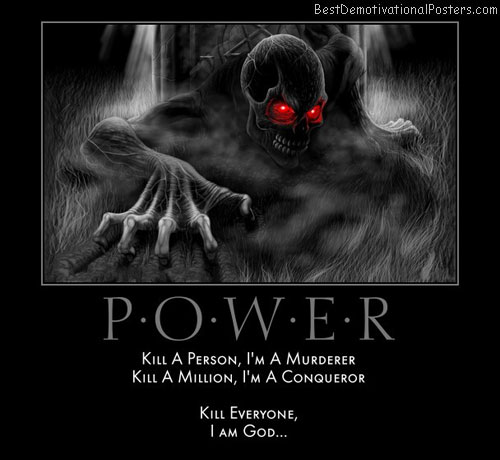Death’s Biopower
They say death does not discriminate. And, for the most part, it’s true. Death comes for all of us one day. Most of us don’t know when that day is and most of us live with the knowledge of our imminent death on the backburner of our conscious. But there are some individuals—the sick, the elderly, the phobic, etc.—who live with death (real and imagined) on their doorsteps every day and are constantly aware of it. Throughout Angels in America, we are introduced to countless individuals who are living in the shadow of death either directly or indirectly.

“Kill a person, I am a murderer. Kill a million, I am a conqueror. Kill everyone, I am God…
As we learned with Foucault, the shift into biopower marked a huge impact on the rise of the discourse on sexuality. But how does one control the life of someone who is already marked by death? I cannot say I know the answer to this question, but I am eager to discuss the importance of biopower in the relationships between the characters in the play, particularly with regards to how the characters who are not facing death themselves handle it. Louis, for example, runs away from death as fast as he can. And although his actions may seem callous or selfish, I do understand them to a certain degree. Isn’t the purpose of life to avoid death? To keep living? I don’t think everyone fears death, but I think very few openly embrace it.
As such, when given the choice between dealing with life and dealing with death, I think that most, if not all, of the characters in this play would ultimately choose life. Like Achilles states in The Odyssey: “By god, I’d rather slave on earth for another man–/ Some dirt-poor tenant farmer who scrapes to keep alive—than rule down here over all the breathless dead.” This is exemplified by Prior’s monologue at the end of Part II where he chooses to go back to living, even though he won’t be a cured man. He says: “Death usually has to take life away…I don’t know if it’s not bravery to die. But I recognize the habit. The addiction to being alive.” (136)
This focus on the addiction to life remains true with regards to the scene I chose to focus on this week (Part I, Act I Scene 7), particularly when Harper deduces that “there’s a part of [Prior], the most inner part, entirely free of disease.” (36) This little part seems to be the innermost piece of Prior’s soul that is completely and fully addicted to life. It is the part that urges him to choose life when he is in Heaven. And perhaps it is that part of Prior that draws the angel to him. After all, angels straddle two universes—they are constantly dealing with both the living and the dead. Prior is perhaps the most ideal candidate out of all the other characters to be “chosen”. Not because he is the most devout or pure, but because he is the physical representation of life and death—the endless desire to live mixed with an illness that sharpens the inevitability of death.
Tags: Angels in America, biopower, Prior Walter, Tony Kushner
